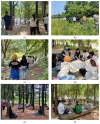Effects of Urban Forest Therapy Program on Depression Patients
- PMID: 36612825
- PMCID: PMC9819035
- DOI: 10.3390/ijerph20010507
Effects of Urban Forest Therapy Program on Depression Patients
Abstract
Depression is a common serious mental health condition that can have negative personal and social consequences, and managing it is critical for treating depression patients. Forest therapy is emerging as a promising non-pharmacological intervention to improve mental health. However, although the effectiveness of forest therapy programs using forests far from the city has been proven, it is not well known that urban forests can be easily accessed in daily life. Therefore, this study aimed to examine the effects of an urban forest therapy program on depression symptoms, sleep quality, and somatization symptoms of depression patients. To evaluate this, a randomized controlled trial (RCT) design was employed. A total of 47 depression patients participated in this study (22 in the urban forest therapy program group and 25 in the control group). The Beck Depression Inventory (BDI), the Hamilton Rating Scale for Depression (HRSD), the Pittsburgh Sleep Quality Index (PSQI), and the Patient Health Questionnaire-15 (PHQ-15) were administered to each participant to assess the effects of the urban forest therapy program. The results of this study revealed that depression patients in the urban forest therapy program had significantly alleviated depression symptoms and improved sleep quality and somatization symptoms compared to the control group. In conclusion, this study demonstrates the possibility that the urban forest therapy program could be used as an effective non-pharmacological treatment to alleviate depression disorder.
Keywords: depression; forest therapy program; urban forest.
Conflict of interest statement
The authors declare no conflict of interest.
Figures
References
-
- Whiteford H.A., Degenhardt L., Rehm J., Baxter A.J., Ferrari A.J., Erskine H.E., Charlson F.J., Norman R.E., Flaxman A.D., Johns N., et al. Global burden of disease attributable to mental and substance use disorders: Findings from the Global Burden of Disease Study 2010. Lancet. 2013;382:1575–1586. doi: 10.1016/S0140-6736(13)61611-6. - DOI - PubMed
-
- World Health Organization Depression. [(accessed on 8 September 2022)]. Available online: https://www.who.int/news-room/fact-sheets/detail/depression.
-
- Institute of Health Metrics and Evaluation Global Health Data Exchange (GHDx) [(accessed on 13 December 2022)]. Available online: http://ghdx.healthdata.org/gbd-results-tool?params=gbd-api-2019-permalin....
Publication types
MeSH terms
LinkOut - more resources
Full Text Sources
Medical


